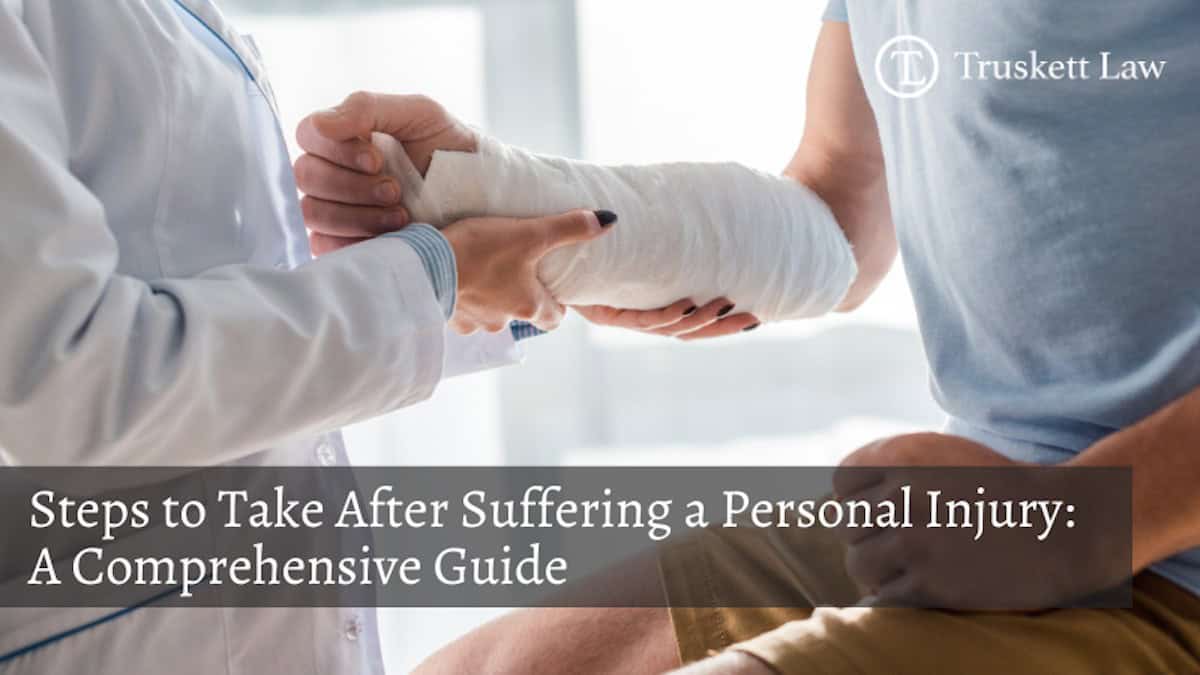
14 Jun Steps to Take After Suffering a Personal Injury: A Comprehensive Guide
What to Do After Suffering a Personal Injury
Suffering a personal injury can be a life-altering event, often leaving you overwhelmed and uncertain about what steps to take next. Knowing the right actions to take is crucial in ensuring your safety, securing your rights, and facilitating your recovery.
In this complete guide, we will walk you through the essential steps to take after experiencing a personal injury, from immediate actions to long-term considerations.
Immediate Actions to Take Following a Personal Injury
The first step after sustaining a personal injury is to assess the situation calmly. Determine the severity of your injury and ensure that you are out of any immediate danger. If you’re in a hazardous environment, such as a busy road or a construction site, move to a safe location if possible.
Ensure Safety
Your safety and the safety of others should be the top priority. If you’re unable to move or if your injury is severe, signal for help. Make sure to stay calm and avoid causing further harm to yourself or others.
Seek Medical Attention
Regardless of the injury’s apparent severity, seeking medical attention is crucial. Some injuries might not show immediate symptoms but can have long-term consequences if left untreated. Call emergency services or have someone take you to the nearest medical facility.
Documenting the Incident
Documentation is key in personal injury cases. Start by gathering as much evidence as possible. This includes details about the accident scene, the conditions leading to the injury, and any relevant objects or hazards involved.
Take Photos and Videos
Visual evidence can significantly strengthen your case. Take clear photos and videos of the scene, your injuries, and any property damage. Ensure that you capture multiple angles and perspectives.
Collect Witness Information
Witnesses can provide crucial support in your case. Collect the names, contact information, and statements of any witnesses who saw the incident. Their accounts can corroborate your version of events and provide additional insights.
Reporting the Incident
Report the incident to the appropriate authorities as soon as possible. This could be the police, workplace supervisors, or property owners, depending on where the injury occurred. An official report creates an official record of the incident.
Report to Insurance Companies
Notify your insurance company about the incident, providing them with all the necessary details. Be honest and accurate in your reporting to avoid complications later on.
Notify Your Employer
If the injury occurred at work, inform your employer immediately. They might have specific protocols to follow, and it’s essential to document the incident for any potential workers’ compensation claims.

Medical Follow-Up
Following your doctor’s advice and sticking to the prescribed treatment plan is vital for your recovery. Attend all follow-up appointments and take medications as directed.
Keep Medical Records
Maintain detailed records of all your medical treatments, including doctor’s visits, medications, and therapy sessions. These records will be essential for your injury claim.
Consult Specialists if Needed
If your injury requires specialized care, don’t hesitate to seek out experts. This might include physical therapists, orthopedic surgeons, or mental health professionals.
Legal Considerations
Contact a Personal Injury Lawyer
Keep all evidence related to the incident safe and organized. This includes physical evidence, documentation, and any communication related to your case.
Store these items in a secure location and make digital copies where possible to prevent loss or damage. Organizing your evidence will streamline the legal process and strengthen your case if it goes to court.

Communicating with Insurance Companies
File a claim with your insurance company as soon as possible. Provide all necessary documentation and be prepared to answer their questions thoroughly. Promptly submitting your claim and cooperating with the insurance company can expedite the process and increase the likelihood of a favorable outcome.
Additionally, keeping thorough records of your interactions with the insurance company can help ensure that your rights are protected throughout the claims process.
Avoiding Common Pitfalls
Be cautious when communicating with insurance adjusters. Avoid making statements that could be used against you or accepting the first settlement offer without consulting your lawyer.
Insurance adjusters may try to minimize your claim or pressure you into accepting a lower settlement than you deserve, so it’s essential to have legal representation to advocate for your rights and negotiate on your behalf.
Remember, the goal of the insurance company is to settle for as little as possible, so having a skilled attorney by your side can help ensure that you receive fair compensation for your injuries.
Negotiating Settlements
Negotiating a fair settlement can be challenging. Your personal injury lawyer can assist in this process, ensuring that you receive compensation that accurately reflects the extent of your injuries and losses.
They will use their knowledge of personal injury law and negotiation skills to advocate for your best interests and pursue the maximum compensation possible. Having a legal expert on your side can level the playing field and help you achieve a fair outcome in settlement negotiations.
Documenting Expenses and Losses
Keep all receipts and bills related to your injury, including medical expenses, transportation costs, and any other out-of-pocket expenses.
Record Lost Wages
If your injury has resulted in lost wages, document the amount of income you’ve lost. This includes salary, bonuses, and any other forms of compensation.
Note Other Financial Impacts
Consider other financial impacts such as long-term disability, the cost of home modifications, or the need for ongoing medical care. Document these as part of your claim.
Understanding Compensation and Settlements
Compensation for personal injuries can include medical expenses, lost wages, pain and suffering, and more. Understanding the types of compensation available can help you make informed decisions.
Calculating Fair Settlement
Work with your personal injury lawyer to calculate a fair settlement amount. This should consider all aspects of your injury, including future medical costs and long-term impacts.
Legal Assistance
Your lawyer will play a crucial role in negotiating and securing a fair settlement. Their expertise can ensure that you receive the compensation you deserve.

Going to Court
If your personal injury case goes to court, preparation is key. Work closely with your lawyer to gather evidence, prepare your testimony, and understand the court procedures. Familiarize yourself with court procedures to reduce anxiety and ensure that you’re prepared for each step of the trial.
Post-Trial Steps
After the trial, there may be additional steps to finalize your case. Your lawyer will guide you through this process and help you understand any further actions needed.


Sorry, the comment form is closed at this time.